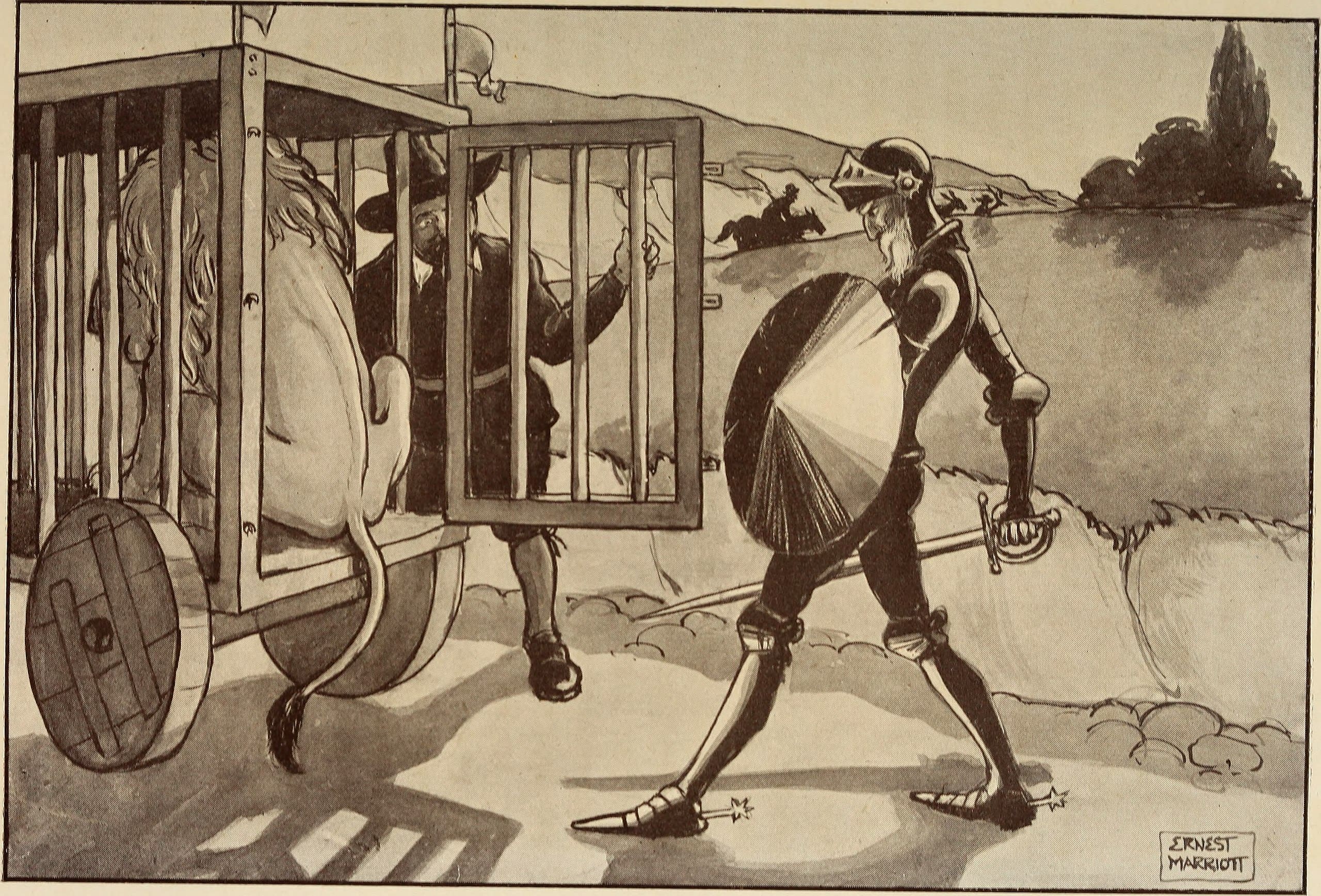C
Chortles and snickers follow Don Quixote wherever he goes. He fights inanimate objects like windmills, believing they are giants. He thinks normal, dirty inns are castles, their inhabitants royalty. Believing a simple barber’s brass sink is an enchanted golden helmet, he “saves” it from the owner in order to properly use and honour the item. He is not only deluded; he lacks any reflection on his action. Vladimir Nabokov calls Don Quixote the “butt of mockery.” While Cervantes’s great masterpiece, Don Quixote, Man of La Mancha, was written more than five hundred years ago, it is a work of modern satire. Quixote himself is satire, incapable of telling the difference between reality and illusion.
We struggle with the same tension today. While we don’t fight over brass sinks, the reasons we fight are the same. What we take for reality turn out in postmodernity to be illusory attempts at self-authorizing identity. The actions we take are geared toward ensuring that our identity is supported and strengthened. As a result, we harm others to shore up our sense of self.
Don Quixote is a constantly decided figure. He does not reflect on right and wrong but acts only on what he immediately takes as one or the other. There is no struggle of discernment, no wisdom of dialogue. Don Quixote is all monologue and heroic rhetoric. If someone else is close enough to hear, all the better. His paper-thin “struggles” for heroism substitute for the depth of the human condition, the need to search and fight for understanding. Kierkegaard calls this subjectivity—the act of becoming. Quixote does not become; he only is a knight, and he fights anything that challenges that idea.
The name for this lack of struggle is sentimentality. The air of it pervades the novel. Quixote never finds himself in the middle of anything. He is always living beyond the margin of decision. Sentimentality is a shortcut: an attempt to acquire emotional satisfaction without any intervening emotional investment. Quixote himself reads like a shortcut. His lack of struggle is an image of a sentimental life.
Sentimentality is a shortcut: an attempt to acquire emotional satisfaction without any intervening emotional investment.
Quixote is written to be a fool. He takes action without taking into account the cost of those actions. This foolish sentimentality is shown to be of great cost to those around him. Because Quixote does not consider any other route than his own, others pay dearly for the protagonist’s actions. Even when Quixote himself bears the weight of those consequences, he passes them off simply as the cost of being a knight errant. Even in suffering he can’t see the burden he places on others. The cost of his sentimentality is borne especially by his squire, Sancho Panza.
It is comical, and sometimes infuriating, to see how little Quixote is aware of his surroundings. He sees only at a hyperbolic, metaphorical, theoretical level, reducing everything to his view of what he wants it to be. There is no complexity. There can’t be any complexity. To introduce any middle ground into Quixote’s field of vision, any third option, would destroy his self-conception.
Most of the time Sancho Panza’s attempts to reason with Don Quixote descend into violence. In his sentimentality Don Quixote wants to fight everything. The famed knight errant takes the credit for his victories but blames his losses on what he calls enchantment. Enchantment for Quixote is a tool, a mystical explanation he can reach for anytime he needs an excuse to win. He lives in his mind. All his adventures, all his thoughts are filtered heavily through delusional references to antiquated notions of knighthood, honour, and chivalry. Coming upon a band of travellers pulling a cage holding two lions, Don Quixote believes he must fight the lions to prove that he is as brave as he declares himself to be. There is no reason to fight, no threat, nothing to do other than pass on the right and keep moving toward his destination. But because the lions are there, present in the road, they become a threat to Quixote’s strength and courage.
As the scene unfolds, we see Don Quixote the crazed knight in contest not against a ferocious beast but with a giant, lazy cat:
So far did his unparalleled madness go; but the noble lion, more courteous than arrogant, not troubling himself about silly bravado, after having looked all round, as has been said, turned about and presented his hind-quarters to Don Quixote, and very coolly and tranquilly lay down again in the cage.
It is only because the lions are there and in front of him that Don Quixote feels like he must fight. He must exemplify bravery. His commitment to “must” leads him beyond reason, past faith, into wild sentimentality. His compulsion to fight has nothing to do with reality. The entire backstory, application, and reflection of the event happens through the eyes of the “never sufficiently praised Don Quixote.”
“Don Quijote was not duty-bound to meet the lion,” writes Edith Rogers. “Yet, one must remember that Don Quijote repeatedly perceived obligations where none had been imposed, such as his assumed madness in the Sierra Morena or all the unsolicited aid he rendered to sundry travelers.” He perceives obligations that are not there, creates scenarios where they did not previously exist. And he does it all to reinforce an identity as a knight errant that he has built up for himself.
How often do we do the same? How often do we cook up scenarios in order to derive some benefit to our identities? How often do we inconvenience others in order to structure a better narrative about ourselves? How often do we perceive things as threats simply because they threaten our picture of how we want to be perceived? Don Quixote’s life is something of a simulation: it exists, but only for the one looking through the lens.
Don Quixote doesn’t fit in Don Quixote’s world. Even he realizes it, confessing at the end of the novel that his perspective was wrong. According to Nabokov, even if he didn’t fit in his world, he fits in ours. As Nabokov teaches in his Lectures on Don Quixote, Don Quixote is “sainted sentimentality.” In our over-sentimentalized culture, the novel, which was intended as satire, is now seen as a picture of earnest heroism, and it is Quixote’s confession and belief that are questionable. Over time and cultural shifts, we have sainted the deluded hero. It is we who have changed, not Quixote. Quixote thus shows us who we have become. He becomes a plumb line for our change, providing a contrast that allows us to ask whether we like our new selves.
In a pluralistic culture filled with individualist ethics, our lives are filled with lion carts waiting for fights that don’t need to happen but do serve to buttress our idea of our identity. We create scenarios that build us up, but at the cost of and inconvenience to others. Don Quixote’s world mirrors our own personalized world of morality.
Over time and cultural shifts, we have sainted the deluded hero. It is we who have changed, not Quixote.
When we fight Quixote’s lions, we choose ourselves over any other self. When faced with conflict and uncertainty, and we are pitted against another individual, we easily and quickly choose ourselves. But obedience to ourselves is disobedience to any other self. When we question another’s decisions, morality itself becomes not a process for determining right and wrong but a competition over whose is better. But the choice is not truly about which rules are better because that presupposes yet another set of rules that is authoritatively better than both. We quickly get roped into a cycle of trying to compete, and in doing so we justify ourselves over another. In Postmodern Ethics Zygmunt Bauman writes,
We use the space where two identities meet as a way to redefine another’s reality and, in a sense, dominate them. For Don Quixote it doesn’t matter what the lion tamer wants or even what the lions themselves want. It only matters what Don Quixote wants. When we are keepers of our own morality, where ethics lives and dies within the space of our own imagination, we maintain our own identity by making sure others act in ways we want them to.
This is how we pick fights now. Our conflicts are not based on a shared reality or ethic. We assert our identity through our opinion. Our justifications for our actions are void of reasonability or reflection. Our assertions simply prop up our idea of who we are.
Quixote’s sentimentality, his fighting lions that don’t want to fight, is an appropriate metaphor for our identity-laden conversations today. We fight, not because we must, and not on behalf of others: we fight because the dialectic forms a buttress that keeps our fragile definition of self intact. Nothing matters as much as that, even the safety, security, and integrity of another.
Don Quixote prefigures the modern idea of “context collapse,” a term coined by researcher Danah Boyd. Context collapse occurs when an object or an idea is presented to multiple groups outside its primary context, which causes people to interpret it on the basis of their own ideals and ideology, usually negatively. Commentary on the object or idea becomes not an opportunity to look at causation but a venue for internal expression.
In a way Don Quixote’s sentimentalism is a form of context collapse. We form an idea of something that resembles not what it is or what it is intended to be but the qualities of what we are against. We become what it is not. Whether in the name of honesty or integrity or authenticity, when we use our identity to frame what we are against, contrasting our beliefs with another’s to build up our own identity, we place the bodies and values of others at the border of our own definition of self.
When we act in this way, we are applying Simone Weil’s concept of force. Force, Weil writes, is whatever “turns anybody who is subjected to it into a thing.” When we interact with another individual, there is a push and pull of force in that meeting. Unaware of how we apply force in each other’s lives, we easily in our mind, according to Weil, turn a person into a thing. In the application of force we dehumanize another in order to hoist our identity.
Quixote’s actions are Weil’s force. He treats people as props, as objects. What we celebrate, his seeming innocence and determined chivalry in the face of the “impossible,” is in fact a destructive form of sentimentality, a series of acts of force that make people into objects. Early in the novel, when Quixote and Sancho Panza meet the aforementioned barber, the knight errant, believing the barber’s travelling sink to be an enchanted helmet, feels obligated to take it because he will be able to properly use it. He charges the barber, the barber runs away, and Quixote takes the sink. The only benefactor in this episode is Don Quixote. Everyone else, including Sancho Panza, who is a fierce arbiter of truth, is nothing other than a prop in Don Quixote’s drama. This is force in anecdote.
In our careful maintenance of our identities, we use force as a tool. We make people things in order to solidify our sense of self. And because the project of forming our identity is so important, we justify or excuse the force we apply to others as a means of self-discovery.
In his introduction to Lectures on Don Quixote, Guy Davenport discusses Nabokov’s understanding of our modern understanding of the book.
His “banner is beauty”: we see Don Quixote as a symbol for all that is pure. But that is not how others experience their interactions with him in his adventure. We filter the force Quixote uses in his actions through his own delusions. He is mocked and beaten several times, but in our zeal to celebrate his actions we overlook their consequences.
We have sainted this protagonist’s sentimentality and have honoured it by applying it in our own relationships. Our identity, Quixote’s knight errantry, keeps us armed and ready for the next fight. In this posture, everything is threat. Every windmill is a giant; every barber is a knight; every inn a castle. We cannot properly identify reality when we live within the action of force.
It is not out of delusion that we are acting as a culture. Rather, it is out of self-protection. Anything to preserve the sainted identity of the modern individual is justified. Those actions that lash out as force may keep the identity protected for a time, but force atrophies the person applying it as much as it harms the person to whom it is applied. The application of force in our relationships dissolves whatever it touches. What begins as a protective measure, over time, breaks down what we are trying to protect.
Instead of beginning at the centre of the self for our marching orders on how to deal with the windmills and lions in front of us, we must learn to become comfortable with humility and vulnerability.
How to live in this world of sentimentalized self-protection, of coercion to protect our fragile sense of self?
Instead of beginning at the centre of the self for our marching orders on how to deal with the windmills and lions in front of us, we must learn to become comfortable with humility and vulnerability. These may seem like trite and worn solutions, but unlike sentimentality and force, they are eternally effective in strengthening relationships. Humility is the ability to acknowledge another outside your own defensive or protective measures, and vulnerability is the act of welcoming that other into your life, not as a buttress to your own identity, but as a source of love for them. These two character traits act as guides for living well with others. We move the priority of identity from the middle of the self to outside the self, into the middle of the relationship. There we can learn how to build instead of dissolve.
Instead of protecting our own identity through veiled sentimentality, we hold up the other and strengthen relationships. Stanley Hauerwas, detailing our lost sense of intimacy, writes that to be intimate with another (in a platonic sense) is to allow that person to make claims on you. You are giving the right to another person to speak into your life. That is the kernel of intimacy—the ability to view relationships through the lens of humility and vulnerability.
We must relearn these qualities and re-inhabit them in community. The church, in taking its orders from one who exhibited utmost humility, becomes a place to practice these virtues. We don’t have to build identities through force. We don’t have to saint sentimentality. Both of these temptations leave us isolated. The church can learn from Jesus, who embodied humility and lived for the other.
We have loved the adventure of Don Quixote. We have tried to become knights errant in the name of maintaining our sainted identities. Our call, though, is to adventure not in sentimentality but in humility and vulnerability. That is where we build what culture has dismissed. To place our hope not in the finitude of self but in the infinitude of the vulnerable God who came to show us what humility is and where we can find it.







